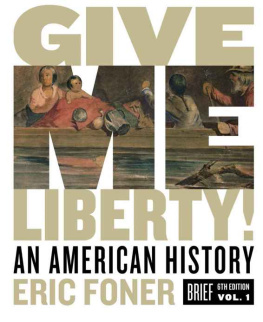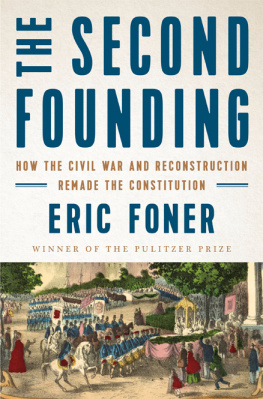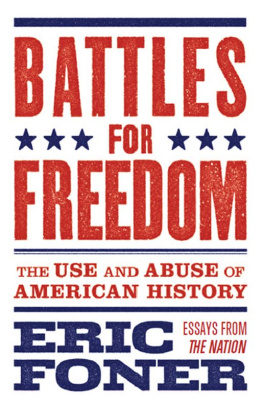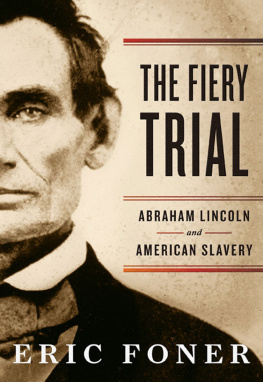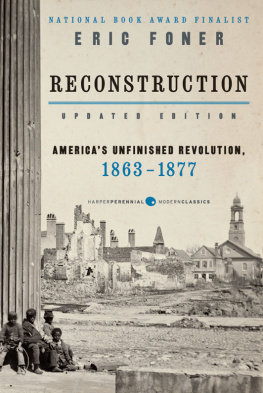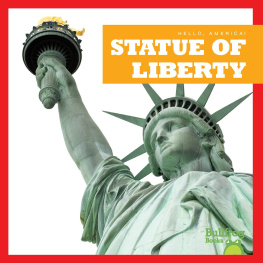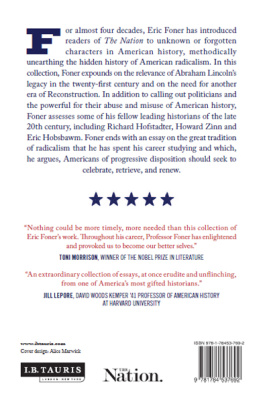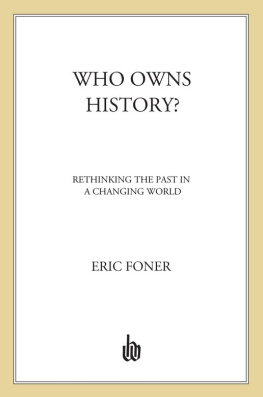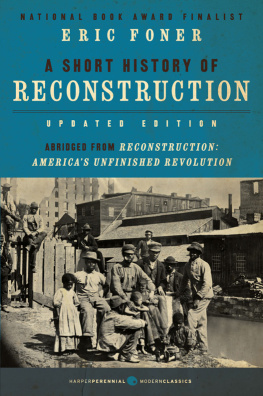Publishers Notice
Please note that this version of the ebook does not include access to any media or print supplements that are sold packaged with the printed book.
For my mother, Liza Foner (19092005), an accomplished artist who lived through most of the twentieth century and into the twenty-first
W. W. Norton & Company has been independent since its founding in 1923, when William Warder Norton and Mary D. Herter Norton first published lectures delivered at the Peoples Institute, the adult education division of New York Citys Cooper Union. The firm soon expanded its program beyond the Institute, publishing books by celebrated academics from America and abroad. By midcentury, the two major pillars of Nortons publishing programtrade books and college textswere firmly established. In the 1950s, the Norton family transferred control of the company to its employees, and todaywith a staff of five hundred and hundreds of trade, college, and professional titles published each yearW. W. Norton & Company stands as the largest and oldest publishing house owned wholly by its employees.
Copyright 2020, 2017, 2014, 2011, 2008, 2005 by Eric Foner
All rights reserved
Editor: Steve Forman
Project Editor: Maura Gaughan
Assistant Editor: Lily Gellman
Managing Editor, College: Marian Johnson
Production Manager: Sean Mintus
Media Editor: Carson Russell
Associate Media Editors: Sarah Rose Aquilina and Alexander Lee
Media Project Editor: Rachel Mayer
Assistant Media Editor: Alexandra Malakhoff
Managing Editor, College Digital Media: Kim Yi
Ebook Production Manager: Danielle Vargas
Marketing Manager, History: Sarah England Bartley
Design Director: Rubina Yeh
Designer: Chin-yee Lai / Lisa Buckley
Director of College Permissions: Megan Schindel
College Permissions Manager: Bethany Salminen
Photo Editor: Stephanie Romeo
Illustrations: Mapping Specialists, Ltd.
Permission to use copyrighted material is included on .
The Library of Congress has cataloged an earlier edition as follows:
Names: Foner, Eric, 1943- author.
Title: Give me liberty! : an American history / Eric Foner.
Description: Sixth edition. | New York : W.W. Norton & Company, 2019. | Includes index.
Identifiers: LCCN 2019031048 | ISBN 9780393675627 (hardcover)
Subjects: LCSH: United StatesHistoryTextbooks.
Classification: LCC E178 .F66 2019 | DDC 973dc23
LC record available at https://lccn.loc.gov/2019031048
ISBN this edition: 978-0-393-41818-7
ISBN 978-0-393-41851-4 (ebook)
W. W. Norton & Company, Inc., 500 Fifth Avenue, New York, NY 10110
wwnorton.com
W. W. Norton & Company Ltd., 15 Carlisle Street, London W1D 3BS
ABOUT THE AUTHOR
ERIC FONER is DeWitt Clinton Professor Emeritus of History at Columbia University, where he earned his B.A. and Ph.D. In his teaching and scholarship, he focuses on the Civil War and Reconstruction, slavery, and nineteenth-century America. Professor Foners publications include Free Soil, Free Labor, Free Men: The Ideology of the Republican Party before the Civil War; Tom Paine and Revolutionary America; Nothing but Freedom: Emancipation and Its Legacy; Reconstruction: Americas Unfinished Revolution, 18631877; The Story of American Freedom; and Forever Free: The Story of Emancipation and Reconstruction. His history of Reconstruction won the Los Angeles Times Book Award for History, the Bancroft Prize, and the Parkman Prize. He has served as president of the Organization of American Historians and the American Historical Association. In 2006 he received the Presidential Award for Outstanding Teaching from Columbia University. His most recent books are The Fiery Trial: Abraham Lincoln and American Slavery, winner of the Bancroft and Lincoln Prizes and the Pulitzer Prize for History, Gateway to Freedom: The Hidden History of the Underground Railroad, winner of the New York Historical Society Book Prize, and The Second Founding: How the Civil War and Reconstruction Remade the Constitution.
MAPS
- CHAPTER 1
- CHAPTER 2
- CHAPTER 3
- CHAPTER 4
- CHAPTER 5
- CHAPTER 6
- CHAPTER 7
- CHAPTER 8
- CHAPTER 9
- CHAPTER 10
- CHAPTER 11
- CHAPTER 12
- CHAPTER 13
- CHAPTER 14
- CHAPTER 15
TABLES AND FIGURES
- CHAPTER 1
- CHAPTER 3
- CHAPTER 4
- CHAPTER 7
- CHAPTER 9
- CHAPTER 11
- CHAPTER 14
PREFACE
Give Me Liberty! An American History is a survey of American history from the earliest days of European exploration and conquest of the New World to the first decades of the twenty-first century. It offers students a clear, concise narrative whose central theme is the changing contours of American freedom.
I am extremely gratified by the response to the first five editions of Give Me Liberty!, which have been used in survey courses at many hundreds of two- and four-year colleges and universities throughout the country. The comments I have received from instructors and students encourage me to think that Give Me Liberty! has worked well in their classrooms. Their comments have also included many valuable suggestions for revisions, which I greatly appreciate. These have ranged from corrections of typographical and factual errors to thoughts about subjects that needed more extensive treatment. In making revisions for this Sixth Edition, I have tried to take these suggestions into account. I have also incorporated the findings and insights of new scholarship that has appeared since the original edition was written.
The most significant changes in this Sixth Edition involve heightened emphasis on a question as old as the republic and as current as todays newspapers: Who is an American?
Difference and commonality are both intrinsic parts of the American experience. Our national creed emphasizes democracy and freedom as universal rights, but these rights have frequently been limited to particular groups of people. The United States has long prided itself on being an asylum for mankind, as Thomas Paine put it in Common Sense, his great pamphlet calling for American independence. Yet we as a people have long been divided by clashing definitions of Americanness. The first Naturalization Act, adopted in 1790, limited the right to become a citizen when immigrating from abroad to white persons. And the right to vote was long denied to many Americans because of race, gender, property holding, a criminal record, or other reasons. Today, in debates over immigration and voting rights, the question of Who is an American? continues to roil our society.
In a nation resting, rhetorically at least, on the ideal of equality, the boundaries of inclusion and exclusion take on extreme significance. The greater the rights of American citizenship, the more important the definition of belonging. Groups like African-Americans and women, shut out from full equality from the beginning of the nations history, have struggled to gain recognition as full and equal members of the society. The definition of citizenship itself and the rights that come with it have been subject to intense debate throughout American history. And the cry of second-class citizenship has provided a powerful language of social protest for those who feel themselves excluded. To be sure, not all groups have made demands for inclusion. In the colonial era and for much of the history of the American nation, many Native Americans have demanded recognition of their own national sovereignty.

